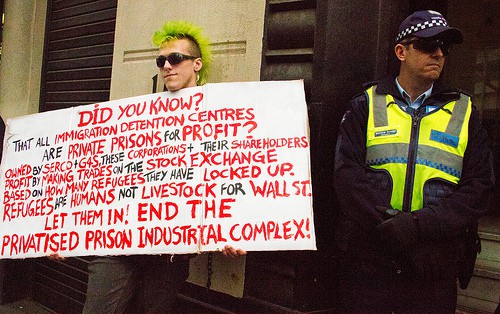By Jemima Light
Since Kevin Rudd’s announcement of the so-called ‘Papua New Guinea solution’ to deter people seeking asylum by boat, I’ve had countless conversations (sometimes heated) with people from a wide range of the political spectrum. I noticed that many of these arguments are mostly committed to dissecting what the morally ‘right’ or ‘wrong’ thing is to do. It is commonly articulated that refugees should have a safe place to go, but not if it conflicts with Australia’s security needs. What these security concerns actually are remains largely unspecified. Therefore, the debate is framed by a desire to attain a ‘humanitarian’ solution with ‘pragmatic’ limitations.
Rarely in these conversations is there an acknowledgement of the high-up governmental figures and private companies who increasingly profit from the suffering and imprisonment of refugees. In fact, many of the solutions proposed rely on a business model of efficiency and profits. Therefore, though this moralistic rhetoric is consistent with ideas of ‘efficiency’- it fails to challenge mandatory detention or the role of the state in implementing policies that imprison people. Furthermore, this rhetoric fails to challenge the justifications for outsourcing detention contracts. The rational is that private companies deal more swiftly and precisely with refugees, relying on the theory that competition will push private companies to improve services to compete successfully in the market.
But in practice ‘efficiency’ translates as profit maximization, not care for people. The business model obscures the way that people are actually treated, and allows private companies to get away with the poor treatment of vulnerable people, often framing a lack of transparency and accountability as ‘client privacy.’ The government also refuses to supply details about companies breaching contracts, claiming these are ‘commercial-in-confidence.’
The main companies with billion dollar private contracts to run refugee detention centers in Australia are Serco (since 2009) and G4S (held contracts prior to Serco, currently run Manus Island). It isn’t hard to find evidence of countless atrocities committed by both of these corporations. They leave a bloody footprint all over the world. For example, G4S involvement in running prisons in Israel and the Occupied Territories, which are notorious for torturing Palestinian children or the murder of Jimmy Mubenga, an Angolan deportee, by three G4S guards. It is deeply flawed logic to rely on companies whose profits depend on perpetuating the conditions that lead to the successful bids for their contracts in the first place. Serco and G4S don’t benefit from losing ‘clients.’
However, I’m not arguing that private companies are worse than the state, exactly. Detention centers run by Department of Immigration and Citizenship are also cruel and untrustworthy. In fact, mandatory detention is inherently cruel and should not be implemented at all.
Rather I’m using the way in which private business operates to reflect on broad trends in governmental practice – of governments absolving themselves of responsibility for peoples’ wellbeing and offloading their obligations onto private corporations. These services become something to buy and sell. In doing so, the actions of these corporations are de-politicized. They are considered extra-statist, obscuring the deep links between the state and themselves. But it is, after all, governmental policies that provide the very conditions for these corporate interests to stake a claim on these services in the first place.
It is also telling to examine the past employment history of many G4S and Serco employees. Often they have been leading state security figures, usually ex-army or police force, frequently with shady pasts. Kerry McNamara, a sacked Victorian police detective is now the security boss in G4S firm on Manus Island. McNamara was sacked for assaulting and stealing drugs from drug dealers. He was also involved in the notorious Tasty nightclub raid conducted by the Victorian police force, during which a number of gay and transgender people were strip searched, assaulted and detained for several hours.
Refugees are being imprisoned, sent offshore, and deported to dangerous circumstances. It is not enough to ask what should be done in terms of right and wrong and thereby relying on the government to make the ‘right’ decisions. We must also demand to know who is profiting from refugees’ continual imprisonment. This includes the government, as well as private companies and their combined interests. Only then, can conversations shift away from the constant appeal to government to do what is ‘right,’ to a realization that perhaps it isn’t just rational argument that can radically change the current situation. Maybe it is time to disrupt business as usual.

